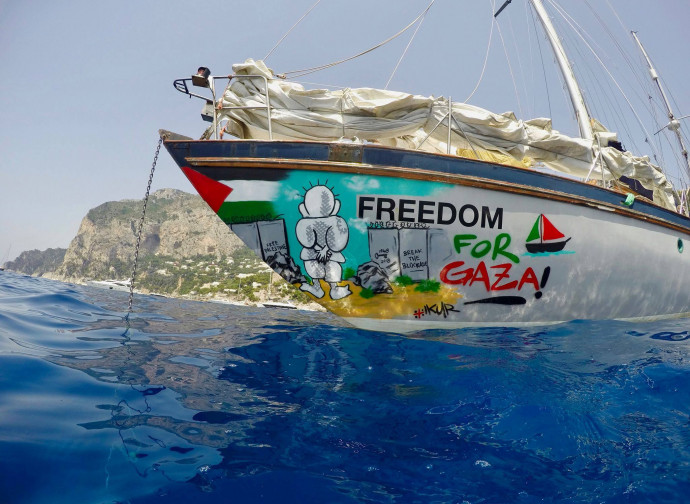The Global Sumud Flotilla does not benefit Gaza
The large-scale operation involving around fifty boats heading for Gaza from Mediterranean ports with a cargo of humanitarian aid is, in reality, a political and propaganda exercise that only benefits those who are promoting it.

War is a serious matter, even a tragic one, yet there are always those who try to turn it into a farce. This is what is happening again these days with the Global Sumud Flotilla (Sumud is an Arabic word meaning 'resistance'), a fleet of around fifty ships that have left various Mediterranean ports with a cargo of humanitarian aid and intend to break the Israeli naval blockade of Gaza.
This initiative involves associations from 44 countries and has the support of several governments. It joins other high-profile pro-Palestinian protests, such as the disruption to the Tour of Spain cycling race on 3 September and the blockade of the railway station in Pisa yesterday. During the ongoing Venice Film Festival, a public demonstration was organised, effectively preventing the participation of actors Gerard Butler and Gal Gadot, who have been accused of supporting Israel's actions in Gaza.
These initiatives all have one thing in common: the harm they cause to people who have nothing to do with them, from train passengers and cyclists to the public who follow the protests. They also draw attention to those who promote them.
The same can be said for the Flotilla, which is certainly the most sensational demonstration, and is receiving a great deal of coverage in the press and on television. It is a purely political action in the style of Greenpeace, which puts those who promote it in the spotlight, but is absolutely useless from a humanitarian point of view. The organisers are well aware that the chances of reaching Gaza are close to zero, given that the Israeli navy is determined to stop the activists, as has already happened with two previous missions. Even if they were to overcome the blockade, they are carrying just 45 tonnes of food (300 tonnes in total has been collected). According to UNICEF, 62,000 tonnes of food aid are needed every month to cover basic needs: approximately 2,000 tonnes per day. In practice, the food that could arrive in Gaza after two to three weeks of sailing would only cover the daily needs of the population for just over two days. All this has been funded by €2 million in donations, not counting the cost of the boats, which varies from €30,000 to €50,000 per unit. In short, the cost-benefit ratio is disastrous from a humanitarian point of view.
In reality, the benefits for organisers and participants are of a different kind: political and in terms of visibility. There is no reason to draw attention to a forgotten tragedy. It would be different if the flotilla were heading for Sudan, where the world's worst humanitarian catastrophe is taking place and being ignored by everyone. The spotlight is already on Gaza: the situation is constantly monitored in newspapers and on television around the world, and there are ongoing protests against Israel. Therefore, Gaza does not lack publicity; on the contrary, the flotilla is shifting attention away from Gaza and the Palestinians living under bombardment with little food or medicine, and towards the pro-Palestinians sailing against the Israeli navy. As mentioned earlier, this is a classic Greenpeace operation, where the causes defended are merely a pretext for attracting attention and funds.
Another benefit sought is political, and it is no coincidence that several politicians, including some from Italy, have boarded or will board the ships. Their greatest success would be an act of force by the Israeli navy or an accident at sea, which would cause an international diplomatic incident and further isolate the Israeli government. In any case, the personalities and politicians participating would gain great visibility.
But is this really what the people of Gaza need? Evidently not. The situation is truly dramatic, and to argue that the image of a population on the brink of collapse is merely Hamas propaganda is the result of disturbing ideological blindness. While one may doubt the accuracy of Hamas's figures and the impartiality of UN humanitarian organisations, there is also a small Catholic community in Gaza. Through the Latin Patriarch of Jerusalem, Cardinal Pierbattista Pizzaballa, they are sending news confirming the tragedy unfolding and the unprecedented violence of the Israeli armed forces. Cardinal Pizzaballa himself has travelled to Gaza several times — one of the few external witnesses, given that Israel prevents journalists from entering — to denounce the immorality of these actions.
The situation in Gaza is indeed dramatic, and the scale and ruthlessness of the Israeli offensive are indefensible. This must be said bearing in mind the danger posed by Hamas not only to the Middle East, but to the world.
But what is needed least of all are spectacular actions for the benefit of those who promote them.
